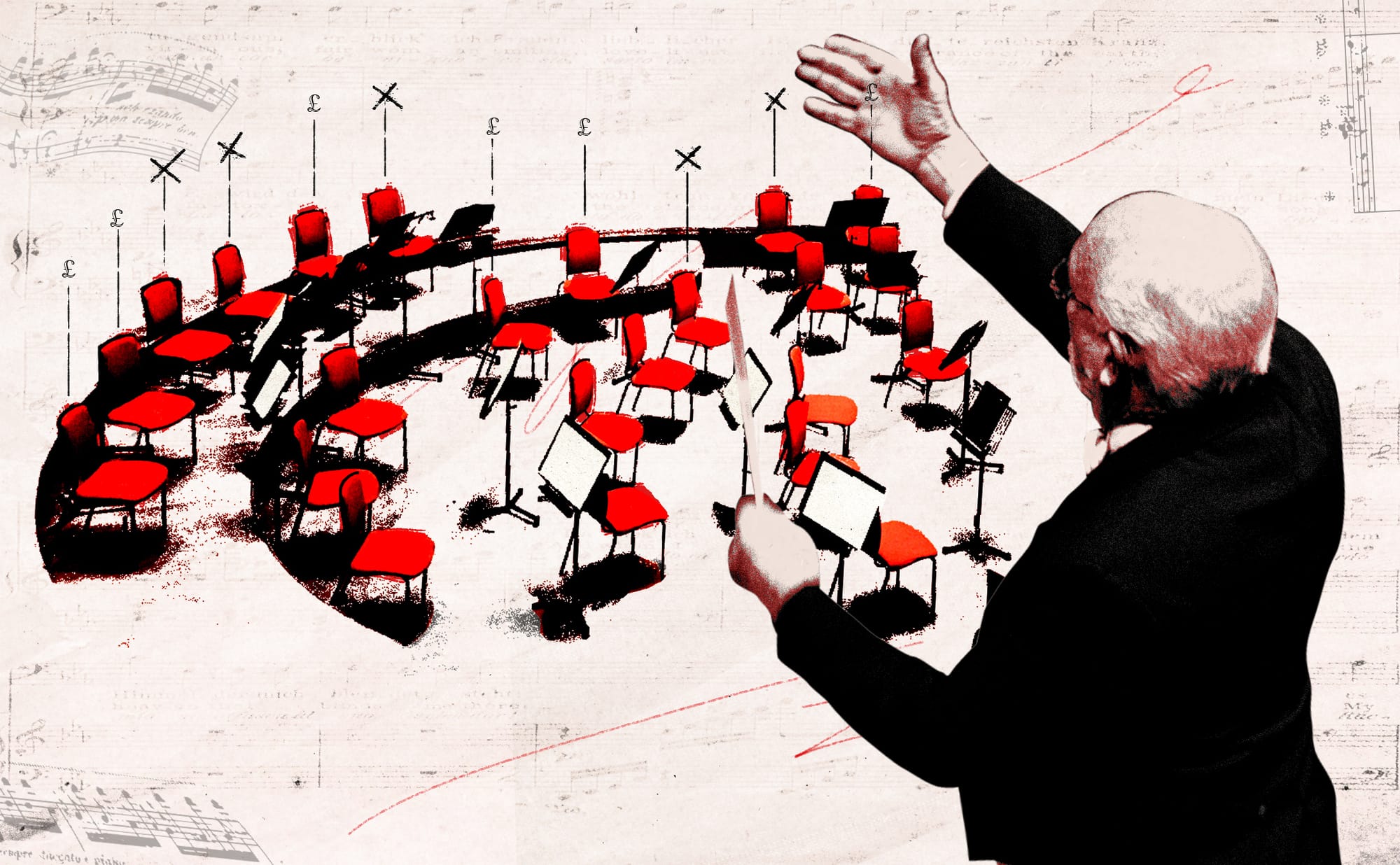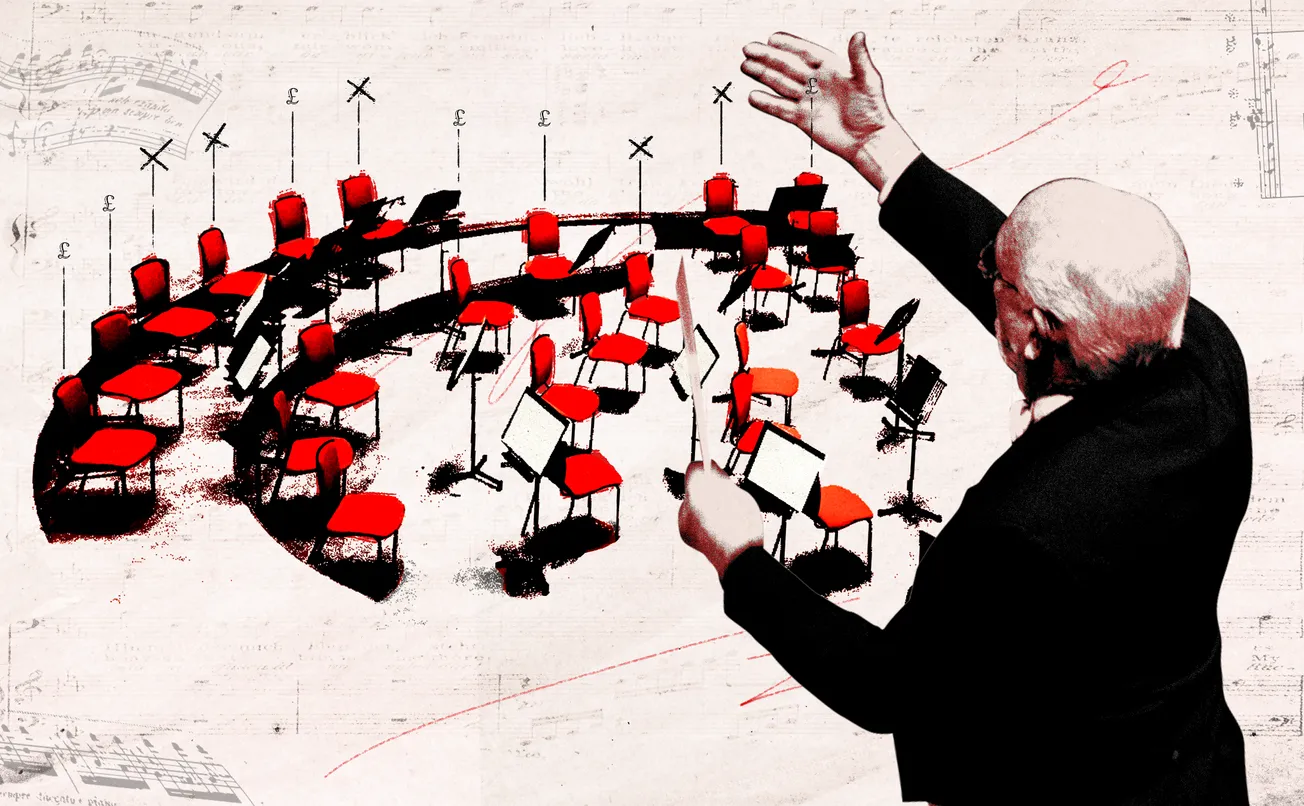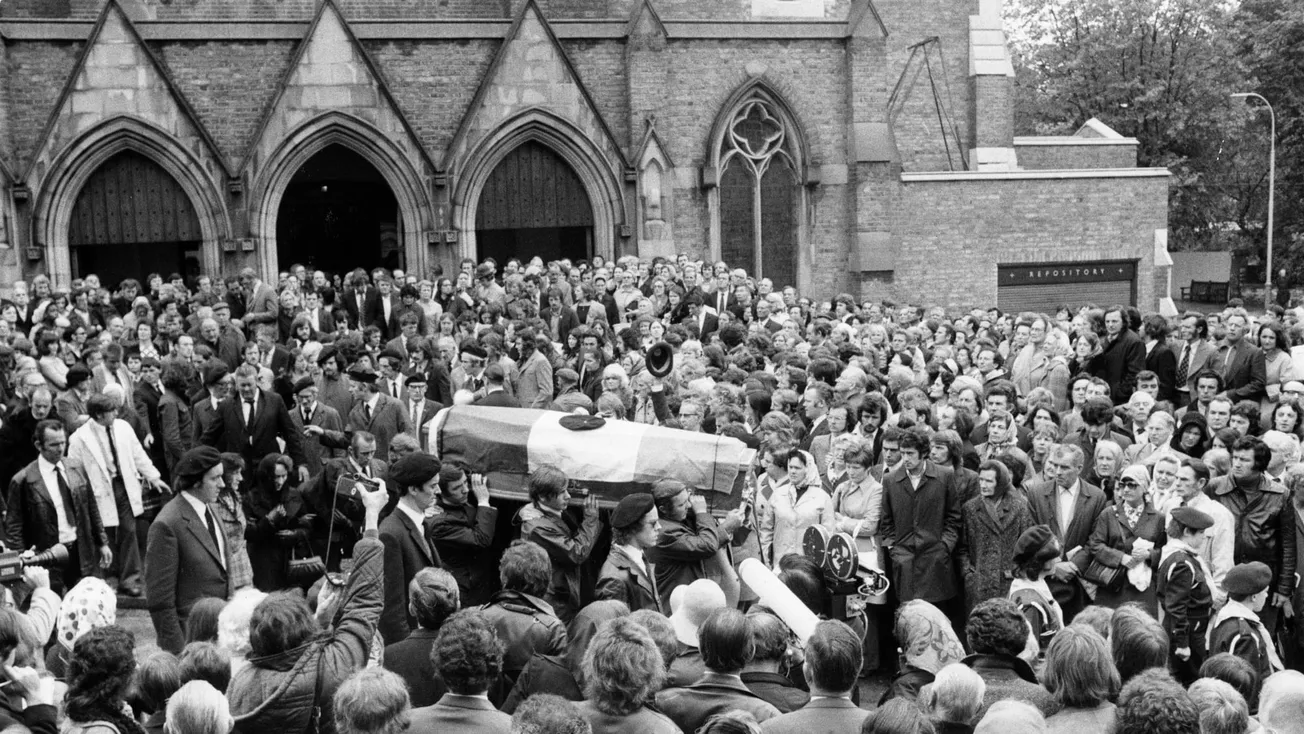On the afternoon of 7 February 2024, the renowned London Chamber Orchestra was rehearsing for a concert set to take place the following evening, featuring music by Mozart as well as a new French horn concerto by a fast-rising British composer.
The mood in the room was testy. Some of the musicians who were due to perform at the prestigious 950-seat Cadogan Hall in Chelsea had dropped out of the concert at the last minute because they hadn’t been paid for previous work, and had to be hurriedly replaced. Even in the world of classical music — known for uncertain freelance work and poor pay — this was unusual. The London Chamber Orchestra (LCO) had a stellar reputation and a colourful history, having performed at the wedding of William and Kate (Queen Camilla is a patron), been heckled by Oasis at the Mercury Music Prize, and had a hand in creating some of the finest pieces of chamber orchestra music of recent times.
Jocelyn Lightfoot, the young CEO of the orchestra, wasn’t present to address any of the concerns around payment. Neither was Martin Childs, a businessman and very keen amateur French horn player who had become the orchestra’s owner and managing director a few years previously, before moving into a role on the orchestra’s associated trust. The conductor, Christopher Warren-Green, a previous owner of the orchestra who had since relinquished administrative responsibilities, said there was nothing he could do.

In the end, the show went ahead and was considered a success. Writing for Seen and Heard International, one reviewer praised the performance, pointing out the “superb” communications between the horn and the orchestra. But what should have been a moment for the LCO to build on turned out to be a final chord. Save for a gig in the shopping centre at Battersea Power Station on Valentine’s Day last year, the orchestra hasn’t given any more concerts since that point. Their website is dormant, as is their social media presence. Music Junction, the LCO’s award-winning outreach project for young people, went quiet too.
Since that point, questions about the LCO have spread among classical music heads. This was the longest-running chamber orchestra in the country, an institution stretching back over one hundred years. How did it vanish so suddenly? Not just that, but people wondered if something particular had gone wrong at the LCO or whether its collapse pointed to something broader in London’s musicland: a bad portent of things to come.
‘Orchestras are like sharks’
Outside of a few specialist corners, like veteran music journalist Norman Lebrecht’s blog Slipped Disc or Private Eye’s ‘Music and Musicians’ column, the media rarely reports from behind the scenes of the classical music industry. So it was a surprise when the Observer covered the fallout surrounding the Cadogan Hall concert last February. The article initially claimed that half the LCO musicians walked out of the rehearsal, though the report’s wording was later changed to clarify that nobody had walked out of the rehearsal itself, but a handful had dropped out of the engagement last-minute and had to be replaced. The Observer also spoke to Lightfoot, who cited the decision by Barclays to freeze the orchestra’s bank account as the primary reason for the delayed payments. She would later claim that most of the musicians’ overdue payments had been made and that a full payment run had gone out on 5 February.
Although the story seemed to go quiet afterwards, in the background, things only continued to escalate. According to Charity Commission documents published at the end of December, six of the seven trustees of the London Chamber Orchestra Trust resigned on 16 February last year. A month later, Lightfoot also resigned from her position as CEO. “From that day forward, all activities and management of the company was suspended,” the document states.
In an attempt to uncover precisely what was happening, The Londoner contacted 25 people involved with the LCO and various relevant groups like the Guild of Hornplayers, an organisation set up by Childs and dedicated to the promotion of the French horn. Of those who responded, almost all said versions of: Sorry, we don’t know what happened, and we’d like to find out, too.

Multiple people directed me to the top of the organisation for more information — the orchestra lacked player representation on management boards, and many felt there had been a lack of communication from management over the future of the orchestra since the Cadogan Hall concert. (When musicians from the orchestra approached the trustees following the concert in February to ask for clarification on the situation, they were advised to direct any further questions to Lightfoot or Childs.)
The orchestra has been silent for almost a year now, with some artists still left out of pocket by the organisation. Some have lodged complaints with unions to try to get the money they’re owed (a representative for the Musicians Union told us in December that they were not able to discuss the LCO situation.) Others were less hopeful. Ben Goldscheider, the soloist from the Cadogan Hall concert, says he is still owed £2,750 for his performance almost a year ago. Dani Howard, the LCO’s 2022/23 composer-in-residence, says she was contracted to be paid £36,200 across one year for five major projects. £20,600 of that money was never paid, though she stopped writing music for the LCO fairly soon into the year after suspecting that payment might be an issue, and brought forward other commissions to fill the gaps. (“I'm not well positioned to really comment further on the organisation,” Howard added.)
Other freelancers I spoke to said that they were still owed money by the LCO and its associated entities, but given a multitude of factors — lack of communication, fatigue, time elapsed, and confusion about the structure of the organisation and who exactly owed them money — they felt it easier to cut their losses and put the situation behind them. Higgins, the composer who wrote the new horn concerto, says he didn’t receive the right commission fee and told me: “I just stepped out of it at one point because I was exhausted with the whole thing. I just wanted to move on.”
“Orchestras are like sharks,” writes Jessica Duchen in the concluding chapter of her 2022 book, London Chamber Orchestra: 101 Years of Transformation. This attitude impacts those who play in them: a strong sense of camaraderie is fostered between members in rehearsals, on the concert stand, and increasingly, in players’ WhatsApp groups, where grumbles and gripes are exchanged, often directed towards management. But, as Duchen continues, orchestras are like sharks because they need to move forward, constantly adapting to the market.
The LCO’s restlessly innovative spirit has the royal seal of approval. “There are, surely, few orchestras which connect with their audiences and supporters as effectively as LCO has over the past century,” Queen Camilla, an LCO patron and then the Duchess of Cornwall, wrote in her foreword to 101 Years, which tells the story of an orchestra that has “surfed the waves of history.” The LCO was founded by Anthony Bernard in 1921. As the music sector adjusted to life after the First World War, small was the order of the day. That immediately gave the group a distinctive musical identity; less beholden to the warhorses of the Classical and Romantic-era symphonic repertoire, English composers from antiquity, such as John Dowland and John Blow, made their way onto the programmes, as did the new music of the day, in UK premieres from the doyens of 20th-century musical composition: Stravinsky, Ravel, Janáček, Poulenc and Vaughan Williams.

Bernard, who died in 1963, was part of a long line of energetic, conductor-impresario figures in British classical music. Such conductors have traditionally overseen a precarious orchestral working situation. In this model, the musicians are freelancers; work comes at a guaranteed rate, but not a guaranteed volume, and isn’t protected if tastes, standards, funding streams or friendships change.
The LCO has always worked on this kind of model. It’s essentially a private orchestra, rarely in receipt of funding from the government, run by a small team of administrators committed to a flexible, pro-enterprise outlook, and reliant on an engaged charitable body — the LCO Trust — to do its fundraising. The private sponsors also help to fund Music Junction, the orchestra’s educational outreach wing, which runs music workshops for school-age children, and brings together students from state and private schools.
Bernard’s successor was Christopher Warren-Green, whose actions embodied the kind of “transformation” that Duchen’s book title alludes to. Critics agreed that the revitalised LCO sounded better than ever under Warren-Green, who I haven’t been able to speak to for this story. How? “I sacked all the players,” Warren-Green told the LA Times. It was out with the old (longstanding players, conductors, seated performances, tailcoats) and in with the new (new musicians, and performances of Philip Glass at the Hammersmith Odeon with mood lighting and jazzy outfits). These might seem like small tweaks, but in the orchestral world, where performance practice has rarely changed in hundreds of years, any small tweak is amplified.
Warren-Green was at the helm when one reinvention happened. The next one, when Lightfoot and Childs entered the fray, would be just as dramatic.
The new regime
According to the website of Martin Childs Limited, his company “specialises in timber, stainless steel and HDPE water control structures and pre-fabricated anti-slip panels.” Whether it’s lock gates, or “Fish-Friendly Flap Valves,” the company covers all manner of water-based products. His passion, however, is playing the French horn, specifically, playing the French horn in French horn ensembles — a niche pursuit even within classical music. In 2018, Childs created the Guild of Hornplayers: a concert-programming, music-commissioning, instrument-hiring, video-making horn appreciation society. Childs financed the whole thing and through the horn world came into contact with Jocelyn Lightfoot, a freelance horn player who was looking for a route into arts management.
Lightfoot’s background is more typical of the kind of person working in orchestral management today. After training at the Royal Academy of Music, she took on organisational roles — she was briefly a member of a committee representing freelancers for the Musicians Union — that could complement her freelance horn playing. Her relationship with the LCO began as a consultant employed by Childs, but she clearly impressed quickly: within three years, she had become managing director of the orchestra, and then its CEO. This was a new position for the LCSL (as a reminder, that’s the company behind the orchestra), and reflected a new and more formal governance structure.

Publicly, Lightfoot was very much the modern CEO. There were panel appearances, tête-à-têtes with other CEOs in industry magazines, and lots of LinkedIn posts. Lightfoot’s decision to scrap traditional concert dress so that musicians could “express their individual personalities and backgrounds” raised eyebrows, but, by and large, the industry response was positive. “She is energetic, full of enthusiasm and ideas, sharp, witty… a breath of fresh air,” said Kevin Whitlock, editor of trade magazine International Arts Manager, in a cover feature on Lightfoot in 2021.
It was a swift rise. In four years, Lightfoot had gone from studying a CIPD qualification in human resources at Northampton College to CEO of one of London’s most historic orchestras. But her fall was similarly swift, and three years later, she had vanished from public view.
Who’s to blame?
The public filings relating to the LCO raise questions. Until it closed, the London Chamber Society Limited (LCSL) supported the day-to-day running of the orchestra, with an accompanying trust, the London Chamber Orchestra Trust (LCOT), fundraising in support of the LCSL. The accounts themselves, however, are far from transparent. Currently, the limited company accounts are only made up to June 2022, with the next set over ten months overdue, and there is an active proposal to have the company struck off at Companies House. (Another associated company, London Chamber Orchestra Limited, was previously struck off in July 2023).
What records show is a revolving door of trustees at the trust. A new batch of trustees were only in post for a few weeks before they resigned in February 2024, but this pattern of change was more widespread. Only one trustee — John Wates, a longtime backer of the orchestra, a former chairman of the trust and a noted philanthropist — served continuously in the period from 2019 to February 2024, a time in which a complete change of management and ownership had occurred. (Wates also resigned in February last year; he was contacted for comment by The Londoner.) Constant change was part of the reason for the trust’s fluctuating fundraising capacity: between 2022 and 2023 there was a sharp decline in income — of over £170,000. At one point during this period, there were only three trustees.
When I spoke to Childs briefly on the phone, he said that he was unable to comment beyond a brief synopsis of what happened, citing legal issues relating to Lightfoot. (Later, he said that he had received no remuneration from any LCO-related organisation, and that the company owes him over £550,000.) For his part, he said that his personal circumstances — involving an acrimonious divorce, on top of his continued commitment to running his business — meant he couldn’t be as involved in the orchestra as was necessary, in either his managerial role on the LCSL, or his trustee role in the LCOT. He directed any further questions to Lightfoot.

In an email, Lightfoot said she was “no longer involved with the London Chamber Orchestra or any of its associated entities,” and that she had “no further information or insight to offer for your article.” When pressed, she said that her role was operational, and that “the most appropriate person to address any questions about the LCO’s activities or governance” was Childs.
Neither Childs nor Lightfoot had the experience one might expect to carry out their roles: Lightfoot, in the lower rungs of orchestral management; Childs in the shrewd, dedicated, long-term philanthropic work needed to fund an orchestra running on tight margins. But both were in positions of authority as the LCO fell, and, today, both are directing responsibility for that towards each other.
Lightfoot’s experience with the orchestra has clearly been extremely bruising — a promising career has been badly damaged by what happened at the LCO, and she is said to feel ostracised by former colleagues and upset about being blamed for things that she feels were outside her control.
This sad situation is emblematic of the way that in the classical music industry in this country — which receives much less public subsidy than countries like Germany or Finland — groups like the LCO are always one bad year away from disaster. Everything has to be right to survive: Top-level orchestral management requires high-level commitment, a solid knowledge of and history in orchestral music, and an ability to find a way out of tight financial situations, while promising meagre pay, and carrying the very real potential for it all to fall apart. And, despite appearing to be run like a business, this is a context that requires a philanthropic approach to investment, rather than a business-style one. An orchestra is extremely unlikely to deliver a financial return on investment, or be in a position to pay back any kind of sizeable loan.
The revolving door continues to move. In November, Michael Timinis, co-owner of the Cypriot fashion group M.G. Timinis & Sons, became the new chair of the orchestra’s trust. A previous chairman of the LCO’s Development Committee, perhaps he will have the funds, contacts and balanced personal life to lead the LCO into another transformation. Maybe there’ll even be a return to the jazzy outfits.
For the musicians and other artists who used to make a good chunk of their living from this orchestra, the perpetual challenge of making ends meet in a prestigious but precarious industry just got harder. Orchestral players have to move on to stay in the game, and particularly in London, it seems like younger, hipper versions of the LCO model arrive every month (examples from recent years include the 12, Her, Chromatica, and Figure Ensembles, the Fantasia Orchestra, and even another orchestra called the LCO, the London Contemporary Orchestra) driven by conservatoire grads with energy, enthusiasm and ideas.
Will the London Chamber Orchestra become another one of the names in Duchen’s book, like the British Symphony Orchestra, or the New Philharmonia Chamber Orchestra: a ghost of the past, its members long gone? People might think of classical music as a stable world of formality and tradition, but there is often drama and financial trouble stirring under the surface. You could hardly improve on the story of the LCO to illustrate that: The disappearance of an institution with royal patrons and an illustrious history in a world capital city like London because, for a brief period, the people in charge couldn’t make the finances stack up.
If you’re not a classical music regular and you’d like to give it a try, we recommend catching the London Philharmonic Orchestra playing Tchaikovsky and Rachmaninov on Wednesday 19th, Royal Opera House’s production of Mark-Anthony Turnage’s hotly anticipated, rapturously reviewed opera Festen (running until 27 February), and this Saturday at Stone Nest, Figure Ensemble, playing music by Vivaldi, Handel, Caroline Shaw, Freya Waley-Cohen, and Joanna Ward.
If you know more about this story, please get in touch.

Comments
How to comment:
If you are already a member,
click here to sign in
and leave a comment.
If you aren't a member,
sign up here
to be able to leave a comment.
To add your photo, click here to create a profile on Gravatar.






